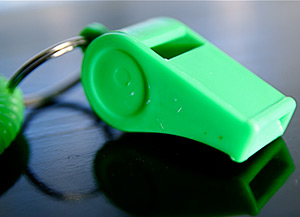21 May 2013, by Mark V. Vlasic.
In many ways, the United States has led the global fight against corruption with its famous (and infamous to some) Foreign Corrupt Practices Act (FCPA). In 2010, however, the FCPA took new meaning, when the U.S. Congress passed the Dodd-Frank Wall Street Reform and Consumer Protection Act (“Dodd-Frank”). Dodd-Frank grants the U.S. Securities and Exchange Commission (“SEC”) the authority to reward individual whistleblowers who voluntarily provide the U.S. government with original information about a violation of the FCPA.

Credit: flickr / stevendepolo
With Dodd-Frank, the United States has provided a model legal framework for expanding state resources in the fight against global corruption by solving the collective action problem, which, in many ways, impedes the fight. The reform provides incentives for individual participation in a realm that has traditionally been the exclusive purview of state actors.
The scale of global corruption is huge. According to the World Bank, between USD 20 billion to USD 40 billion are stolen from developing countries every year. The recent, high profile asset recovery efforts against Mu’ammar Qadhafi, long- time leader of Libya, and Charles Taylor, former President of Liberia, illustrate both the scope of global corruption and the toll that it exacts on the developing world.
Some reports claim that Qadhafi allegedly embezzled, stole, and otherwise illicitly acquired as much as USD 200 billion in assets, which would amount to USD 30,000 per Libyan citizen. And while the international community took swift action to freeze some of his assets, when one considers the time it has taken to recover stolen assets from past dictators, it is likely that the search for Qadhafi’s assets will last decades.
And it is quite likely that the search for Charles Taylor’s assets will also last decades. While he only served six years as Liberia’s president, it is estimated he acquired nearly USD 3 billion – money that should be used to help the people of Liberia.
Stories like Qadhafi’s and Taylor’s, though extreme, are unfortunately common and thus, in an effort to curb such abuses, countries, international organisations and NGOs are working together to help prevent them from happening again.
The United Nations Convention against Corruption (UNCAC) obliges signatory governments to return illicit assets to their rightful owners, and to their credit, governments do work together to find, freeze, and return assets stolen by corrupt officials. Taking international cooperation to a new level, then-World Bank President Robert Zoellick and UN Secretary General Ban Ki-moon partnered in 2007 to launch the Stolen Asset Recovery (StAR) Initiative, which works with developing countries and financial centres to help recover the proceeds of grand corruption.
While international efforts to fight corruption are at work in every corner of the world, the United States has shown great dedication to prosecuting corruption. Since 1977, the U.S. government has employed the FCPA to punish and deter corrupt behaviour by American companies. The FCPA essentially makes it unlawful for any U.S. person to bribe a foreign official to obtain or retain business. The statute is written and interpreted broadly to cover most people and companies with any connection to the United States.
Penalties for violating the FCPA are substantial. Corporate violators may be barred from competing in the federal procurement process and may face criminal fines—oftentimes, up to millions of dollars. In addition, individual violators face criminal fines and even prison sentences.
In 2010, Congress emboldened the fight against corruption by passing Dodd-Frank. The congressional legislation presents a novel and promising new anti-corruption tactic. It democratises the global fight against corruption by giving private citizens a true and tangible financial stake in the fight – a monetary reward – and at the same time, mitigates the information inequalities that hamper governments’ efforts, and reduces the collective action problem that oftentimes disincentivises whistleblowing.
Though the SEC regulations have been in effect for less than a year and there is little evidence yet of the effectiveness of the United States’ newest weapon in the fight against corruption, the Dodd-Frank model has the potential to be modified and implemented in various other countries. Given the large sums of assets allegedly stolen by men like Qadhafi and Taylor, the model could have a substantial opportunity to affect the fight against corruption. Only time will tell how effective private actors can be in a realm traditionally controlled by the state. But due to the amount of money that is at stake, the world is likely to be watching as whistleblowers begin to collect their bounties and support the fight against corruption.
About Mark V. Vlasic
Mark V. Vlasic, an adjunct professor of law at Georgetown University Law Center and senior fellow at Georgetown’s Institute for Law, Science & Global Security, served as head of operations of the World Bank’s StAR Secretariat and worked on the “Baby Doc” Duvalier/Haiti and Charles Taylor/Liberia asset recovery teams. A former member of the Slobodan Milosevic and Srebrenica genocide prosecution trial teams at the UN war crimes tribunal in The Hague, he is now a principal at Madison Law & Strategy Group PLLC, where he leads the international practice.



